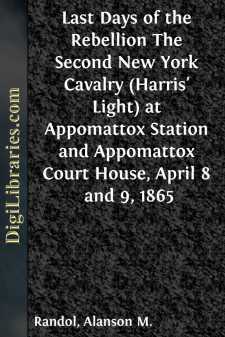Categories
- Antiques & Collectibles 13
- Architecture 36
- Art 48
- Bibles 22
- Biography & Autobiography 813
- Body, Mind & Spirit 142
- Business & Economics 28
- Children's Books 17
- Children's Fiction 14
- Computers 4
- Cooking 94
- Crafts & Hobbies 4
- Drama 346
- Education 46
- Family & Relationships 57
- Fiction 11829
- Games 19
- Gardening 17
- Health & Fitness 34
- History 1377
- House & Home 1
- Humor 147
- Juvenile Fiction 1873
- Juvenile Nonfiction 202
- Language Arts & Disciplines 88
- Law 16
- Literary Collections 686
- Literary Criticism 179
- Mathematics 13
- Medical 41
- Music 40
- Nature 179
- Non-Classifiable 1768
- Performing Arts 7
- Periodicals 1453
- Philosophy 64
- Photography 2
- Poetry 896
- Political Science 203
- Psychology 42
- Reference 154
- Religion 513
- Science 126
- Self-Help 84
- Social Science 81
- Sports & Recreation 34
- Study Aids 3
- Technology & Engineering 59
- Transportation 23
- Travel 463
- True Crime 29
Last Days of the Rebellion The Second New York Cavalry (Harris' Light) at Appomattox Station and Appomattox Court House, April 8 and 9, 1865
Description:
Excerpt
LAST DAYS OF THE REBELLION.
During the winter of 1864-5 the Second New York (Harris’ Light) Cavalry was in winter quarters near Winchester, Va., on the Romney pike. Alanson M. Randol, Captain First United States Artillery, was colonel of the regiment, which, with the First Connecticut, Second Ohio, and Third New Jersey, constituted the first brigade, third division, cavalry corps. The division was commanded by General George A. Custer; the brigade by A. C. M. Pennington, Captain Second United States Artillery, Colonel Third New Jersey Cavalry. On the 27th of February, 1865, the divisions of Merritt and Custer, with the batteries of Miller (Fourth United States Artillery) and Woodruff (Second United States Artillery), all under command of General Sheridan, left their winter quarters in and around Winchester, and, after a series of splendid victories, and unsurpassed marches and fortunes, joined the Army of the Potomac in front of Petersburg on the 27th of March. The Second New York Cavalry shared largely in the glories and miseries of this great and successful raid. At Five Forks, Deep Creek, and Sailors Creek, it not only maintained its gallant and meritorious record, but added to its great renown. At the gentle and joyous passage of arms at Appomattox Station, on the 8th of April, it reached the climax of its glory, and, by its deeds of daring, touched the pinnacle of fame. On that day it performed prodigies of valor, and achieved successes as pregnant with good results as any single action of the war. By forcing a passage through the rebel lines and heading off Lee’s army, it contributed largely to the result that followed the next day—the surrender of the Confederate Army of Northern Virginia.
On the night of the 7th of April we camped on Buffalo River. Moving at an early hour on the 8th, we crossed the Lynchburg Railroad at Prospect Station, and headed for Appomattox Station, where it was expected we would strike, if not intercept, Lee’s retreating, disintegrating army. The trail was fresh and the chase hot. Joy beamed in every eye, for all felt that the end was drawing near, and we earnestly hoped that ours might be the glorious opportunity of striking the final blow. About noon the regiment was detached to capture a force of the enemy said to be at one of the crossings of the Appomattox. Some few hundreds, unarmed, half-starved, stragglers, with no fight in them, were found, and turned over to the Provost Marshall. Resuming its place in the column, I received orders to report with the regiment to General Custer, who was at its head. Reporting in compliance with this order, General Custer informed me that his scouts had reported three large trains of cars at Appomattox Station, loaded with supplies for the rebel army; that he expected to have made a junction with Merritt’s division near this point; that his orders were to wait here till Merritt joined him; that he had not heard from him since morning, and had sent an officer to communicate with him, but if he did not hear from him in half an hour, he wished me to take my regiment and capture the trains of cars, and, if possible, reach and hold the pike to Lynchburg....


